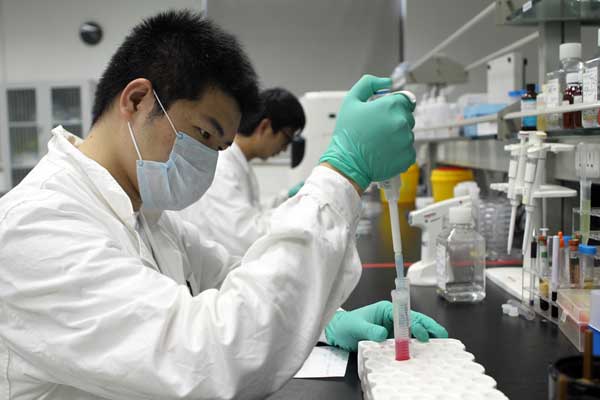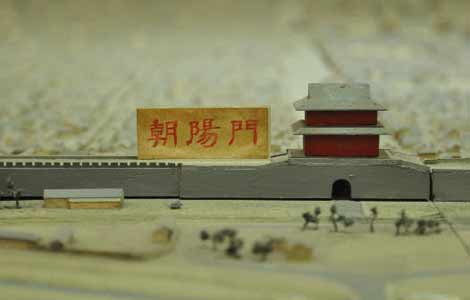Central city with a global vision
Updated: 2013-08-24 00:30
By LYU CHANG and ZHOU LIHUA (China Daily)
|
|||||||||||
Central China city of Wuhan has been growing fast, and is aiming to build itself into the world’s Silicon Valley of optical fiber, report LYU CHANG and ZHOU LIHUA
Wuhan, capital of Central China's Hubei province, is among China's fastest-growing cities and home to significant economic activity, as the government encourages urbanization in the middle reaches of the Yangtze River.
Local planning officials estimate Wuhan's economy is growing at about 12.5 percent annually, and that gross domestic product should double in the next five years.
 |
|
Employees work at a laboratory in YZY Biopharma Co Ltd in Wuhan, Hubei province. Wuhan offers high-quality human resources and a strong R&D capacity for companies. [Guan Xin /china daily ] |
But those strengths are not the city's only bragging points. Located at the intersection of the Yangtze and Hanjiang rivers, Wuhan is building itself into the world's Optical Fiber Valley.
Small startup enterprises and international powerhouses have flocked to the metropolis of more than 10 million people, attracted by talent resources and favorable government investment policies.
The dream of being a world-class Optics Valley is becoming a reality, as the city already tops the world in optical fiber and cable production.
It accounts for about 55 percent of the domestic market in these products and 25 percent internationally.
One of the driving forces is the Wuhan East Lake High-tech Development Zone, which generates more than 500 billion yuan ($81.7 billion) a year in revenue, accounting for more than half of Wuhan's GDP.
Dubbed the Optical Valley of China, it is also the birthplace of the first optical fiber and proprietary ultra-long-haul optical transmission system in the nation.
Other industries such as petroleum engineering, food processing, alternative energy, environmental protection and services outsourcing, are also forging ahead rapidly.
The annual output of the city's electronic information sector is projected to rise to 380 billion yuan in 2015 from 114 billion yuan in 2010.
Though far from the nation's booming coastal regions, Wuhan can offer benefits and preferential policies with incentives for startups, such as one-year interest-free loans and three years of free rent.
Nearly 6,000 foreign enterprises have set up operations in the city, and about 100 of the world's top 500 companies have invested in 124 projects in Wuhan.
Xia Yamin, deputy director of the administrative committee of the technological and development zone, said the focus now is on developing innovative companies.
The zone has maintained an annual growth rate of 25 to 30 percent for the past decade, but it could be difficult to keep up this pace in the next five years, given the much larger revenue bases.
"Innovation is the key for future growth," Xia said. "We should go beyond being a manufacturing base and become a magnet for economic development and innovation."
Going digital
Last year, Wuhan built a Software New City nearby. It's a core startup project of the Wuhan East Lake High-tech Development Zone, aiming to create Silicon Valley-type high-tech industrial clusters of innovation in Central China.
The high-tech development zone has forged agreements with the United States' Silicon Valley, and companies such as Oracle Corp intend to set up operations in Wuhan.
Shao Hui, general manager of Wuhan Software City Development Co, said that more than 1,000 world-class enterprises will set up their Chinese operations and offices in the software park.
There, they'll pursue software development and IT services, work on the Internet of Things and explore cloud computing.
With a total investment of more than 10 billion yuan and an area of more than 3 square kilometers, the park will provide hundreds of thousands of jobs after construction is complete at year-end.
It is estimated that its annual output value will surpass 50 billion yuan.
"We are not simply moving software companies from the US here," Xia said. "Instead, we are trying to learn from their management and business models to create the largest and most internationalized base of software and information services in Central China."
So far, the high-tech development zone has established 13 technology business startup parks, 11 industrial technology alliances and more than a dozen technical centers and other service agencies to help new companies get off the ground.
At Chinese startup Hongtuo New Technology Co in the Wuhan East Lake High-tech Development Zone, a senior engineer showed off the company's products: rapid lasers that can be widely used in the medical, new energy and new material industries.
Founded in 2009, the company has about 40 staff, and it has seen strong growth in the high-tech market with key clients such as Bayer AG, the pharmaceutical giant, and Huawei Technologies Co Ltd, the world's second-largest telecoms network equipment maker.
Li Derong, a senior engineer of Hongtuo, said starting from scratch, the company got huge support from the Wuhan East Lake High-tech Development Zone.
"When we moved to the zone, we were given an entire floor, with space of 1,000 square meters, as our operating office," he said. "It is free for the first three years."
Li said the park helped the company a lot, offering something more than just a startup deal. Rather, it has an eye on long-term development for investors.
Xia said the idea is not just to attract companies but also to help them stay.
"Providing low initial costs is only the beginning. Once a company settles here, we are paying more attention to their operating costs," he said.
Education
"The top reason we came here is the educational environment. The city has a great talent pool," said Zhou Pengfei, chief executive officer of Wuhan YZY Biopharma Co Ltd, a biotech company that develops innovative oncology drugs.
Zhou, a returnee from Stanford University in the US, said Wuhan offers high-quality human resources and a strong R&D capacity.
Wuhan is home to about 80 universities, where some 1.2 million students were registered last year, and 100 high-tech research institutions with 80,000 researchers and technicians.
It has also 20 national laboratories and 20 national R&D centers.
A total of 59 academicians of the Chinese Academy of Sciences and Chinese Academy of Engineering work at these universities and institutions in Wuhan.
Wuhan highlights the government's determination to support the rise of Central China. Last month, President Xi Jinping paid a field trip to Wuhan, further underscoring government support for the growing trend of industrial relocation from coastal areas to inland regions.
Tang Liangzhi, mayor of Wuhan, envisions his city as a major metropolis in central China.
"The main point in promoting the rise of the ‘Central China policy' is developing urbanization in the middle reaches of the Yangtze River. Essential to that is supporting Wuhan in its drive to be a national center" for technology, he said.
Lu Jinyong, a professor at the University of International Business and Economics in Beijing, said that the city's education and technological strengths, and its transit hub status, make it evident that Wuhan will play an important role in the nation's development.
Its skilled labor force could help it become the world's Optics Valley.
But promoting itself as a hub of central China is no easy task, he said. It will be difficult to retain an innovative workforce with current salary levels.
"The challenge also lies in building a nice living environment, as well as high incomes, to meet the demand of specialists and scientists, so that it can keep them here," he said.
Liu Kun contributed to this story.
Related Stories
Seven-star hotel to open in C China's Wuhan 2013-08-23 11:30
Wuhan a prime spot for international rowing hub 2013-07-27 08:27
4th Global Auto Forum in Wuhan 2013-07-01 15:21
Wuhan to host international rowing in July 2013-05-22 05:38
Today's Top News
Joint sea drill shows improved ties
Rainstorms and floods wreak havoc
Experts call for details on rumor cases
Market regulators need to fix loopholes
UN to probe alleged chemical attack
Bo insists he did not abuse power
Using stray cats for rat control sparks debate
More aid for students from impoverished families
Hot Topics
Lunar probe , China growth forecasts, Emission rules get tougher, China seen through 'colored lens', International board,
Editor's Picks

|

|

|

|

|

|





